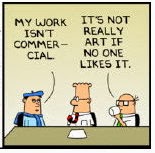One of the harsh realities of life when you work for a
support function like Marketing is when you are asked to come up with
“creative” solutions for in-house publicity (because we believe in crowd
sourcing and we may not have money to hire agencies to do this job).
Creative? Sure, I can be creative, you say. Didn’t I just
write food reviews about that new restaurant and pass it off as ‘client testimonial’
in the company’s recent pitch deck? We earned a “wow” from the customer (That the
restaurant was so happy with the publicity that they refrained from pressing
charges is another matter). And how about the time I came up with the breast
cancer awareness campaign? (PS: Does it matter that I was drunk and needed to
vent and that only pink color highlighters were available for me to scribble on
the reception walls?)
I live CREATIVE man, bring on the brief, you metaphorically
yell.
Ok. How about “fresh and vibrant”?, says the boss with a
wide smile that indicates he had spinach at last night’s party.
You: Fresh? Like soapy fresh or perfume fresh?
Boss: Umm. You know, fresh. Like FRESH.
You: Umm.. Ok. Vibrant like multi color? Gujarati tribal
clothes type?
Boss: No. that’s bright. I want bright. Bright that is
vibrant. You know like nice colors. Punchy tagline.
You: Huh? Tagline? What tagline?
Boss: I want every picture to have a tagline.
You: Picture? You mean the entire imagery we create? Like an
Ad?
Boss: Yes. You nailed it! I want an Ad Bro!. That will be
put up in our reception area.
Seven iterations and as
many cups of black coffee later….
Boss: Umm. This is kind of not resonating the message Bro.
You: Didn’t you say fresh and vibrant?
Boss: Yes. And that is exactly what this is not. I want
fresh and vibrant. This is like something done in a hurry.
Even as you want to tell him “YES, IT WAS DONE IN A HURRY,
since you came up with this just this morning,” your brain tells you something
else and you end up saying
You: Fresh and Vibrant. Like how?
Boss: I know you can do better. (give fake sympathetic
look). Why don’t you have lunch and then try?
Seventeen iterations, two
coffee machine malfunctions, and three green teas later…..
You: What are the timelines on this thing?
Boss: Leave that to me. Just do your job.
You: Yes, but we have had 17 iterations. Are we getting
anywhere close to your idea?
Boss: No. This picture is not telling me anything. This is
not calling out to me. Sorry. But I don’t like this.
You: But I stuck to the brief. What more do you want?
Boss: I want fresh
and vibrant! Colors! Green yellow, pink, white, red! Well, not red, I don’t like
red. But you get me right?
You: But that will hide our message and the colors will take
precedence.
Boss: I get what you are trying to say.. Hmm. Um… You know
what? Forget about the message.
You: Huh? But why? Without a message the graphic will become
plain art.
Boss: What’s bad about that? I like art. Art is fresh and
vibrant.
You: You can commission an artist and use him/her to create
something. I am not the one with those skills?
Boss: You are not an artist? What kind of a designer are you
then?
You: I am not a designer either.
Tail piece: You copied something you saw on Google because
the boss “loved it.” He loved it so much
that he insisted on signing the ‘master piece’ with his fake signature. He also gave you a 500 rupee dinner voucher
to dine at the Taj. You know the voucher will not cover event the cost of
coffee.
